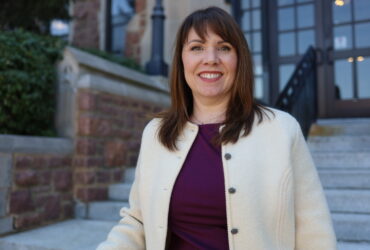 Exploring Caregiver Coaching in Deaf Education
Exploring Caregiver Coaching in Deaf Education
Fontbonne is proud to congratulate Dr. Dorie Noll, assistant professor of Communication Disorders and Deaf Education on receiving the Ph.D. Thesis Award from the School of Rehabilitation Sciences at the University of Ottawa, Canada.
Dr. Noll conducted research on caregiver coaching in Listening and Spoken Language (LSL) practice with families of children who are deaf or hard of hearing, an under-researched niche in the Communication Disorders and Deaf Education field. Dr. Noll’s research used interviews and observations to gather qualitative data. This data was collected to examine how caregivers are coached by LSL practitioners.
LSL is a field within rehabilitation sciences that employs a set of strategies and principles that teach children with hearing loss to listen and speak. Dr. Noll’s research aimed to document and build understanding of how both caregivers and practitioners experience this coaching process.
“My research provides a much-needed foundation for better understanding caregiver coaching, which may lead to better preparation and more consistency of the coaching practices among LSL practitioners,” Dr. Noll explains. “Ultimately this could positively impact families receiving services for their children who are deaf or hard of hearing, learning to listen and talk.”
Dr. Noll’s research led to three peer-reviewed academic publications: Coaching Caregivers of Children who are Deaf or Hard of Hearing: A Scoping Review, “It’s About Walking Alongside a Family”: Practitioner Perspectives on Caregiver Coaching with Families of Children Who Are Deaf or Hard of Hearing, “It gives me confidence”: Caregiver Coaching from the Perspective of Families of Children Who Are Deaf or Hard of Hearing.
Background and Career
Dr. Noll is the parent of a young adult who is deaf. Her personal experience led her to pursue further education and a career as an early intervention practitioner with a specialization in LSL. Dr. Noll completed her master’s degree in Deaf Education at Washington University in St. Louis, choosing to build a career as an early intervention practitioner in St. Louis. She also does service work with the Global Foundation for Children with Hearing Loss. Dr. Noll works as an assistant professor in Fontbonne’s Communication Disorders and Deaf Education department.
“I chose Fontbonne because I believe in the mission and values that are so evidently lived out by the faculty,” Dr. Noll said. She worked with the families of children who are deaf or hard of hearing for 11 years before beginning her Ph.D. program. During that time, she observed a gap between the recommendations to coach caregivers of deaf and hard of hearing children, and the research to support such recommendations. “I was frustrated by the strong emphasis on caregiver coaching in early intervention but the lack of evidence for its application […] or even consensus on what it meant and how to implement it.” Dr. Noll explained, “This lack of research base along with the personal and professional significance it holds for me led me to address this gap.”
She left St. Louis to pursue a Ph.D. in Rehabilitation Sciences at the University of Ottawa.
“Leaving St. Louis to pursue my Ph.D. gave me a broader understanding of our field in general and challenged me to learn about the systems and practices of early intervention in Canada,” Dr. Noll shared. “It required me to challenge my assumptions, critically reflect on my expertise […] and gave me a more global perspective of the state of the field of rehabilitation sciences.”
Dr. Noll completed her work at three early intervention sites: two in St. Louis and one in Ottawa. She encountered several logistical challenges related to the COVID-19 pandemic. While Dr. Noll continued to work from home, the obstacles she encountered significantly slowed her progress.
“I was able to come back to St. Louis for two weeks and conduct interviews with practitioners and parents. Then I flew back to Ottawa two days before things started shutting down due to COVID-19,” Dr Noll recounted. “While I was fortunate to collect data at two of the three sites before restrictions were put in place, Ottawa shut down completely. I was unable to access a lot of the resources I needed for data analysis and writing. I was [also] unable to interview practitioners and parents in Ottawa for quite some time.”
Dr. Noll defended her thesis in the fall of 2022.
The Transformative Journey of a Ph.D.
The Ph.D. award came as a pleasant surprise for Dr. Noll. “I was really proud of my finished dissertation and believe it adds value to the field of listening and spoken language practice,” She shared. “But my work being recognized as “outstanding” among other doctoral candidates in rehabilitation sciences came as a surprise to me.”
“I am a qualitative researcher through and through, but qualitative research is not always recognized as rigorous or as valued as quantitative research,” said Dr. Noll. “[Winning the award] feels like a validation not only of my work, but of the value that qualitative research adds to our field.”
Dr. Noll’s award has encouraged her to expand her efforts from simply doing her best in her new role as assistant professor at Fontbonne, to include thinking about how to disseminate her research most effectively. Dr. Noll advises aspiring doctoral students to choose a field they are passionate about. “Be prepared to fall forward,” she said, “The passion I have for my area of research kept me going during many obstacles and helped me persist when it felt like I would fail.”
Dr. Noll reflected on the transformational nature of pursuing her Ph.D. “Completing a Ph.D. is a transformational experience,” she shared, “My skills as a researcher and my expertise in my area of interest were not the only things that grew exponentially during this process – I also changed and grew. I see the world in new ways, am more resilient, and am a more confident scholar and writer than I was when I began this process.”
Learn more about Fontbonne’s Department of Communication Disorders and Deaf Education.

